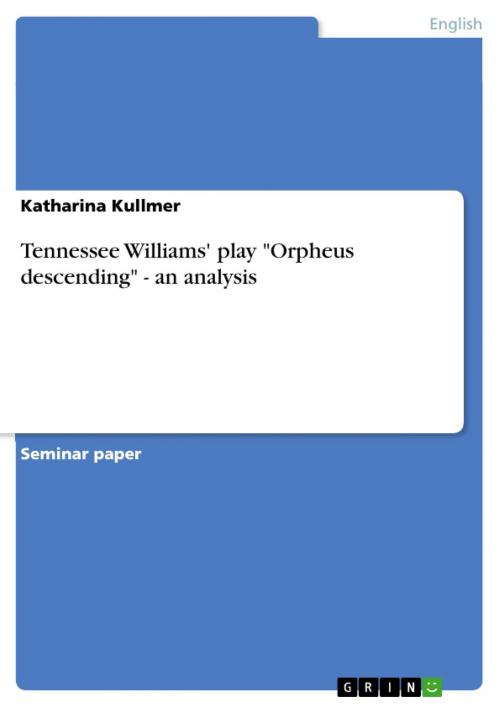Tennessee Williams' play 'Orpheus descending' - an analysis
an analysis
Nonfiction, Entertainment, Drama, Anthologies| Author: | Katharina Kullmer | ISBN: | 9783638895545 |
| Publisher: | GRIN Publishing | Publication: | January 18, 2008 |
| Imprint: | GRIN Publishing | Language: | English |
| Author: | Katharina Kullmer |
| ISBN: | 9783638895545 |
| Publisher: | GRIN Publishing |
| Publication: | January 18, 2008 |
| Imprint: | GRIN Publishing |
| Language: | English |
Seminar paper from the year 2006 in the subject American Studies - Literature, grade: 1,0, University of Frankfurt (Main) (Institut für England- und Amerikastudien), 10 entries in the bibliography, language: English, abstract: The play 'Orpheus Descending' was first presented on Broadway in 1957 where it only had a short run with modest success; it was almost universally condemned by critics. The play is a rewrite of an earlier play by Williams called 'Battle of Angels'. In 1940 the Theatre Guild had produced 'Battle of Angels' in Boston but it had been very poorly received. The play was withdrawn after Boston's 'Watch and Ward Society' had banned it. The reason for this lay within the explosive topics it deals with such as racism, (suppressed) sexuality, adultery, corruption and murder. Even tough Williams rewrote his play several times and worked on it for 17 years, 'Orpheus Descending' too, was harshly criticized and widely considered a failure. Nevertheless, the play has been made into a movie twice: The first movie version was titled 'The Fugitive Kind' (1959) and directed by Sidney Lumet and Tennessee Williams himself. Starring actors were Marlon Brando, Joanne Woodward and Anna Magnani. The second movie version is a TV production from 1990 and bears the name of the play 'Orpheus Descending'. It is directed by British theatre and film director Peter Hall, starring Vanessa Redgrave and Kevin Anderson. Tennessee Williams drama 'Orpheus Descending' involves a lot of aspects that can also be discovered in his more popular plays.
Seminar paper from the year 2006 in the subject American Studies - Literature, grade: 1,0, University of Frankfurt (Main) (Institut für England- und Amerikastudien), 10 entries in the bibliography, language: English, abstract: The play 'Orpheus Descending' was first presented on Broadway in 1957 where it only had a short run with modest success; it was almost universally condemned by critics. The play is a rewrite of an earlier play by Williams called 'Battle of Angels'. In 1940 the Theatre Guild had produced 'Battle of Angels' in Boston but it had been very poorly received. The play was withdrawn after Boston's 'Watch and Ward Society' had banned it. The reason for this lay within the explosive topics it deals with such as racism, (suppressed) sexuality, adultery, corruption and murder. Even tough Williams rewrote his play several times and worked on it for 17 years, 'Orpheus Descending' too, was harshly criticized and widely considered a failure. Nevertheless, the play has been made into a movie twice: The first movie version was titled 'The Fugitive Kind' (1959) and directed by Sidney Lumet and Tennessee Williams himself. Starring actors were Marlon Brando, Joanne Woodward and Anna Magnani. The second movie version is a TV production from 1990 and bears the name of the play 'Orpheus Descending'. It is directed by British theatre and film director Peter Hall, starring Vanessa Redgrave and Kevin Anderson. Tennessee Williams drama 'Orpheus Descending' involves a lot of aspects that can also be discovered in his more popular plays.















